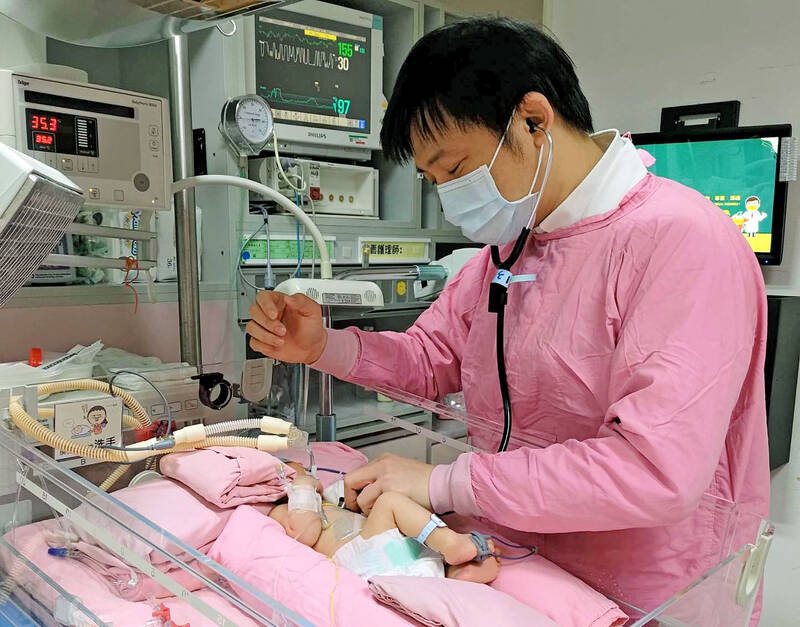A Taiwanese hospital’s research highlights how nationwide newborn screening programs allow the country’s medical sector to diagnose and treat rare diseases such as Infantile-onset Pompe disease (IOPD).
The study, published in the Journal of Medical Genetics last month, says that “starting enzyme replacement therapy (ERT) before severe irreversible muscular damage” is essential to treating IOPD.
Study coauthor Yang Chia-feng (楊佳鳳), a doctor at Taipei Veterans General Hospital’s Department of Pediatrics, told reporters on Tuesday that infants diagnosed with IOPD die of heart and lung failure before they are two years old, and the mortality rate is 100 percent.

Photo courtesy of Chang Gung Memorial Hospital
Contributing author Niu Dau-ming (牛道明), head of the hospital’s Department of Pediatrics, said that Pompe disease is a rare autosomal recessive metabolic disorder that results in the body being unable to process glycogen, the buildup of which damages muscle and nerve cells.
Every year 35,000 to 40,000 children are born in Taiwan, of which one is usually diagnosed with Pompe disease, Niu said.
Due to routine procedures involving muscle biopsies and genetic exams, as well as the National Health Insurance application process for medication approval, it can take three months before a case can start treatment, Niu said.
Citing examples from other countries since 2005 when ERT was first introduced, Yang said it takes about 198 days before treatment can start.
Those who survived after treatment had to live with nasogastric tubes, ventilators, walking aides or were bedridden, Yang said.
Taipei Veterans General Hospital approves the first enzyme treatment within six hours if an infant has low enzymatic activity, decreased muscle tone, creatine kinase levels higher than 250 units per liter and a left ventricular mass index of more than 70g/m2.7, Niu said.
On average, infants at the hospital diagnosed with Pompe disease are receive their initial treatment within 9.75 days, Niu added.
Taiwan listed Pompe disease as a rare disease to test for in 2008 and is the only country in the world that screens for IOPD, Yang said, adding that 36 cases have so far been diagnosed, the oldest of whom is now 13.
Yang said that all cases can walk and eat alone and do not have to use invasive ventilators.
Taipei Veterans General Hospital superintendent Chen Wei-ming (陳威明) said the hospital would continue to foster and support the program.
It is the epitome of advanced medical care as all lives are cherished at the hospital, Chen said.
Health Promotion Administration Director-General Wu Chao-chun (吳昭軍) said that his agency would work with the National Health Insurance Administration to help cover medical costs and assist patients.

Civil society groups yesterday protested outside the Legislative Yuan, decrying Chinese Nationalist Party (KMT) efforts to pass three major bills that they said would seriously harm Taiwan’s democracy, and called to oust KMT caucus whip Fu Kun-chi (傅?萁). It was the second night of the three-day “Bluebird wintertime action” protests in Taipei, with organizers announcing that 8,000 people attended. Organized by Taiwan Citizen Front, the Economic Democracy Union (EDU) and a coalition of civil groups, about 6,000 people began a demonstration in front of KMT party headquarters in Taipei on Wednesday, organizers said. For the third day, the organizers asked people to assemble

POOR IMPLEMENTATION: Teachers welcomed the suspension, saying that the scheme disrupted school schedules, quality of learning and the milk market A policy to offer free milk to all school-age children nationwide is to be suspended next year due to multiple problems arising from implementation of the policy, the Executive Yuan announced yesterday. The policy was designed to increase the calcium intake of school-age children in Taiwan by drinking milk, as more than 80 percent drink less than 240ml per day. The recommended amount is 480ml. It was also implemented to help Taiwanese dairy farmers counter competition from fresh milk produced in New Zealand, which is to be imported to Taiwan tariff-free next year when the Agreement Between New Zealand and

A woman who allegedly spiked the food and drinks of an Australian man with rat poison, leaving him in intensive care, has been charged with attempted murder, the Taipei District Prosecutors’ Office said yesterday. The woman, identified by her surname Yang (楊), is accused of repeatedly poisoning Alex Shorey over the course of several months last year to prevent the Australian man from leaving Taiwan, prosecutors said in a statement. Shorey was evacuated back to Australia on May 3 last year after being admitted to intensive care in Taiwan. According to prosecutors, Yang put bromadiolone, a rodenticide that prevents blood from

China is likely to focus on its economy over the next four years and not set a timetable for attempting to annex Taiwan, a researcher at Beijing’s Tsinghua University wrote in an article published in Foreign Affairs magazine on Friday. In the article titled “Why China isn’t scared of Trump: US-Chinese tensions may rise, but his isolationism will help Beijing,” Chinese international studies researcher Yan Xuetong (閻學通) wrote that the US and China are unlikely to go to war over Taiwan in the next four years under US president-elect Donald Trump. While economic and military tensions between the US and China would